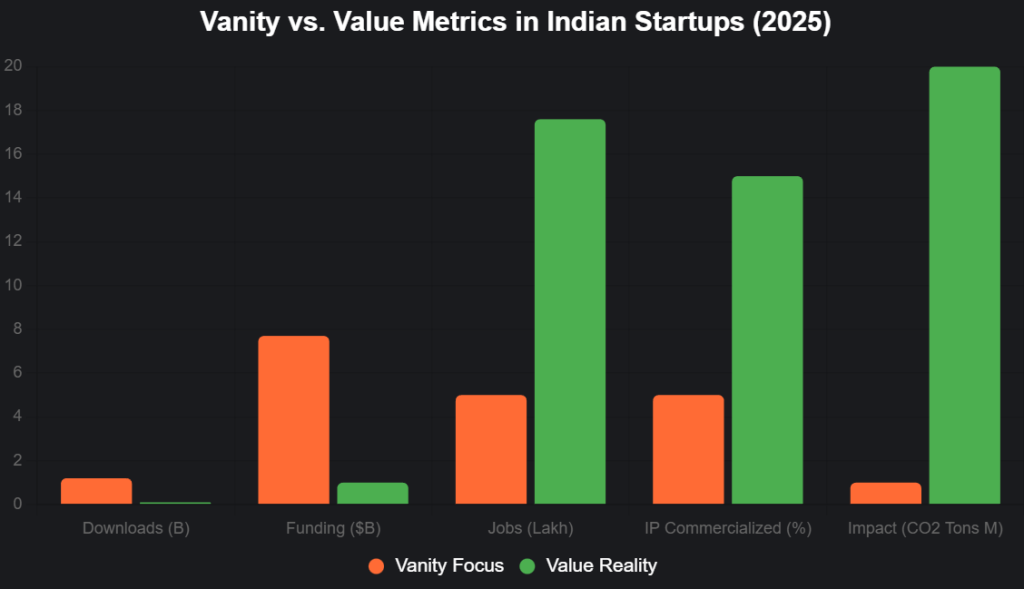What if everything we celebrate about startups is wrong? We toast 100 million app downloads, cheer 1 billion monthly active users, and crown 112 unicorns at $350 billion valuations—yet 90% fail within five years, 11,223 shut down in 2025 YTD (up 30%), and 85% of patents never commercialize.
The philosophical gut punch: Are we measuring vanity (downloads, DAUs, funding rounds) or value (jobs sustained, IP monetized, societal impact)? In a nation where 195,065 DPIIT-recognized startups power a $450 billion digital economy, the current scorecard—obsessed with scale signals—masks fragility. A food delivery app with 50 million downloads but razor-thin margins and 60% churn isn’t success; it’s a vanity vortex. Real success?
Zoho’s $5 billion bootstrapped revenue, ReNew’s 20 million tons CO2 slashed, Phool.co’s 8,000 women empowered. As X founders reflect, “Downloads don’t pay taxes—impact does,” this 1,050-word rethink—practical and philosophical—critiques vanity metrics, proposes a Value-First Framework, and recalibrates success for a $1 trillion innovation economy by 2030. Measure what matters—or mislead the mission.
Table of Contents
The Vanity Trap: Metrics That Mislead
India’s startup narrative runs on dopamine:
- 1.2 billion app downloads (2024, Data.ai)
- 500 million DAUs across top 10 apps
- $7.7 billion funding in 9M 2025 (down 23%, but still celebrated)
But the crash comes fast: 90% failure rate (Tracxn), 70% pre-revenue post-grant (SISFS), 16,000 layoffs in 2023. Vanity metrics—users, downloads, GMV—inflate bubbles: a gaming app hits 100M downloads but burns $50M quarterly with 80% churn. X: “Vanity: 100M downloads. Value: 0 profits.”
This interactive bar chart exposes the disconnect:

Source: Data.ai, Tracxn, UNESCO. Vanity loud, value lasting.
The Philosophical Pivot: What Is Success?
Vanity metrics are inputs—easy to game, hard to sustain. Value metrics are outcomes—hard to fake, built to last:
- Jobs Sustained: 17.6 lakh direct, but only 40% survive 5 years
- IP Monetized: 82,811 patents, 15% commercialized
- Societal Impact: 20M tons CO2 cut (ReNew), 8,000 women empowered (Phool.co)
Zerodha: 1.5M users, but 100% profitable from day one. Zoho: zero VC, $5B revenue. X: “Success isn’t scale—it’s survival with soul.”
The Value-First Framework: 5 Metrics That Matter
| Metric | Why | Target 2030 | Example |
|---|---|---|---|
| Jobs Sustained (5+ Yrs) | Real economic value | 100M | ReNew (13.4 GW) |
| Revenue per Employee | Efficiency | >$100K | Zoho ($400K) |
| IP-to-Revenue Ratio | Innovation ROI | 50% | Qure.AI (95% accuracy) |
| Impact Units | Social good | 1B lives touched | Phool.co (8K women) |
| Survival Rate | Resilience | 70% | Bootstrapped donkeys |
Source: Proposed Framework, 2025.
1. Jobs Sustained (5+ Years)
Not created—sustained. 17.6 lakh now; target 100M by 2030.
2. Revenue per Employee
Zoho: $400K. Average unicorn: $10K. Efficiency > headcount.
3. IP-to-Revenue Ratio
15% now → 50%. From patent to profit.
4. Impact Units
CO2 tons cut, women employed, clinics served—quantified.
5. Survival Rate
90% failure → 70% mastery via AI predictive tools.
This radar chart maps the shift:

Source: Proposed Framework.
Practical Path: Recalibrate the Scorecard
- DPIIT 2.0 Dashboard: Track value metrics, not just registrations
- Investor Mandates: 50% portfolio weight on revenue/IP/impact
- Media Recode: Rank startups by survival + impact, not valuation
- Policy Pivot: Grants tied to 3-year value KPIs
X: “Measure value—or manage vanity.”
The Horizon: $1 Trillion in Real Value
By 2030: 70% survival, 50% IP monetized, 1 billion lives impacted. The philosophical truth: Success isn’t being big—it’s being built to last.
Measure wisely, India. The future depends on it.
social media : Linkedin
also read : Micro-Mobility Mavens: India’s Startups Redefining Urban Commutes in 2025 – Ride or Stall!
Last Updated on Sunday, November 9, 2025 11:40 pm by Entrepreneur Edge Team https://entrepreneuredge.in/